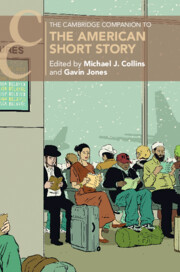Book contents
- The Cambridge Companion to the American Short Story
- The Cambridge Companion to the American Short Story
- Copyright page
- Contents
- Figures
- Tables
- Contributors
- Chronology
- Introduction
- Part I Contexts
- Part II Histories
- Part III People and Places
- Part IV Theories
- Chapter 17 Short Fiction, Language Learning, and Innocent Comedy
- Chapter 18 The Technology of the Short Story
- Chapter 19 Homelessness
- Chapter 20 The Human and the Animal
- Chapter 21 The End of the Story
- Chapter 22 The Affordances of Mere Length
- Notes
- Further Reading
- Index
- Cambridge Companions to…
- References
Chapter 22 - The Affordances of Mere Length
Computational Approaches to Short Story Analysis
from Part IV - Theories
Published online by Cambridge University Press: 11 May 2023
- The Cambridge Companion to the American Short Story
- The Cambridge Companion to the American Short Story
- Copyright page
- Contents
- Figures
- Tables
- Contributors
- Chronology
- Introduction
- Part I Contexts
- Part II Histories
- Part III People and Places
- Part IV Theories
- Chapter 17 Short Fiction, Language Learning, and Innocent Comedy
- Chapter 18 The Technology of the Short Story
- Chapter 19 Homelessness
- Chapter 20 The Human and the Animal
- Chapter 21 The End of the Story
- Chapter 22 The Affordances of Mere Length
- Notes
- Further Reading
- Index
- Cambridge Companions to…
- References
Summary
Do short stories cohere into a genre, different from other prose fiction, merely by virtue of their length, or, as some critics have argued, are there narrative and thematic differences that go beyond the question of how long they are? In this chapter, we turn to Digital Humanities methods to explore these questions in a corpus of around 10,000 short stories published in twentieth-century women’s magazines. As we analyze the deployment of characters, the narrative patterns, and the linguistic variety of the short stories in our corpus, we reveal the ways that these popular short stories trace a new history of short story writing. The constraints of “mere” length, our analysis shows, allow short fiction to develop a new kind of narrative, one different from that of the novel. Rather than simply a side-effect of the genre, the shortness of the short story is fundamental to understanding its narrative possibilities.
Keywords
- Type
- Chapter
- Information
- The Cambridge Companion to the American Short Story , pp. 341 - 357Publisher: Cambridge University PressPrint publication year: 2023



